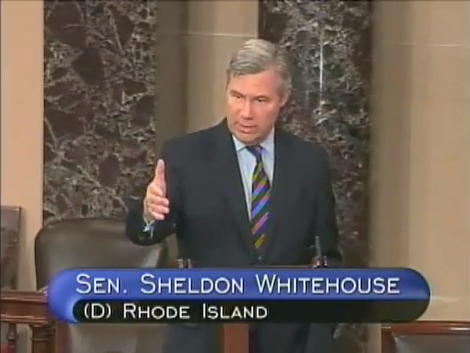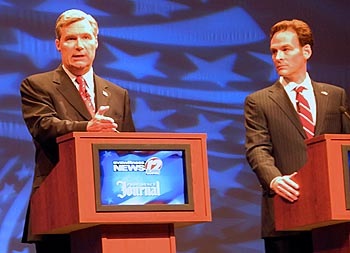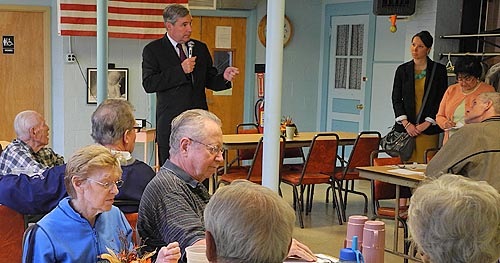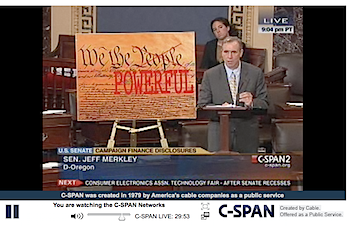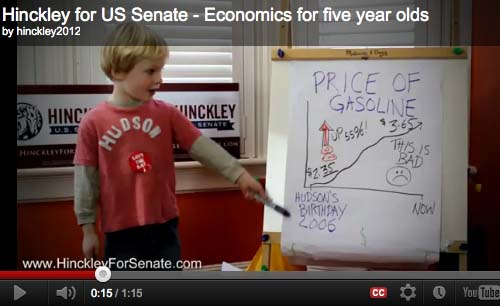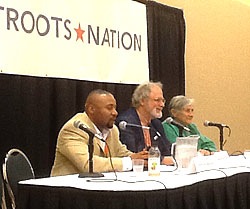 |
| John Jackson, Kenneth Bernstein, and Diane Ravitch at the "War on public education" panel |
Nearly 3,000 bloggers, activists, and political folks descended on the RI Convention center this weekend for a packed schedule of panels, trainings, and workshops on a wide range of political, organizational, and social issues. Rhode Island was well represented at the major events, with popular sessions featuring local progressives from MERI, PPRI, OSA, NEARI, and RIACLU, and local political stars both established (Sen. Sheldon Whitehouse led a great panel on Citizens United) and up-and-coming (State Rep. Teresa Tanzi spoke at the closing keynote right before Gov. Howard Dean.) You can find archived videos at the Netroots Nation site and browse the extensive livetweeting at the Twitter hashtag #NN12. I'm only going to report on the specific panels — for the keynotes, you really should check out the videos on the Netroots Nation site.
Couldn't get there Thursday, so for me, the conference began at 8:30 on Friday, when I got to the exhibit hall for my shift seting up the National Writers Union booth. It was great to meet the staff from the national office and hang out and talk shop for a while. If you're a fellow blogger or freelancer, you should check out the NWU.
The first panel (watch) went from zero to 60 in seconds. With John Jackson (Schott Foundation), teacher Kenneth Bernstein, and education theorist Diane Ravitch, the panelists framed the current situation frankly. "The narrative is that public education is broken," said Ravitch, arguing that the "shock doctrine" was at work in service of forces seeking privatization. "The other piece is attacks on teachers," she said. "If you say it's wrong, you're accused of being a shill for the unions." Jackson described the situation in even more bleak terms: "We're in the season of re-litigating America." He urged calling out not only the "wolves" like ALEC, but also "those in sheep's clothing like Stand for Children." To which Ravitch added, "Or 50 CAN."
If you're wondering what "50 CAN"is, look in this week's Sakonnet Times for the quarter-page ad from their local affiliate, RI-CAN, advocating a change to the state law on mandatory layoff notice dates for teachers. How is it that 501(c)3 organizations can get away with political advocacy? By calling it "education." And guess what? They don't have to disclose their donors. Sweet, huh?
There was a great question from an audience member who worked at a local charter school, prompting Ravitch to offer a nuanced perspective. "We need a typology of charters," she said, that separates the truly public schools that serve local students versus the hedge-fund corporate entities.
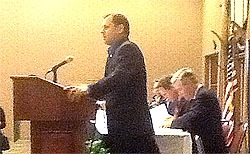
|
| Moderator Tom Perriello and Sen. Sheldon Whitehouse at the Citizens United panel |
The panel on Citizens United (watch) was full of heavy hitters: Sen. Whitehouse, Sen. Sherrod Brown, Sen. Jeff Merkley, CREDO Action's Becky Bond, and Trevor Potter, Stephen Colbert's SuperPAC advisor. Whitehouse kicked off the discussion and he tore into the the Court's decision. "The entire decision hangs on something the Supreme Court is not supposed to do: findings of fact," said Whitehouse. "Citizens United is in the tradition of Lochner v NY and Plessy v. Ferguson," decisions which were widely seen as wrong. "When the Supreme Court makes a mistake," he said, "There is a tendency for it to correct."
Bond attacked the ruling as really being "Billionaires United," and urged that we need to make "people bigger than money." (One way is to join with Credo Action to help take down the Tea Party Ten.) Potter pointed out how Colbert had created his own SuperPAC and 501(c)4 to show the craziness of the system, and wondered about the utility of a constitutional amendment. "When you amend the Constitution," he said, "The Supreme Court still interprets your amendment."
Sen. Merkley asked the packed ballroom of digital activists to consider an "all night blog-in" when Sen. Whitehouse re-introduces the DISCCLOSE Act in July. By the end of the session, there were dozens of bloggers, scribbling frantically on a list that staffers were maintaining at the dais. I'm pretty sure that when DISCLOSE goes to the floor and inevitable filibuster ensues and they roll out the cots, there will be a solid presence in the blogosphere alongside them. I signed up.
 |
| Isham Christie, Yotam Marom, Michelle Crentsil, Mary Clinton, Max Berger. |
The final Friday panel was "That will never work: What we can learn from OWS" (watch) with words of wisdom from folks who were on the ground in the planning and encampment phases of Occupy Wall Street in NYC. Christie ascribed some of the success to "radical humility" and a willingness to just "try this crazy-ass idea." He admitted that at times, they were, of necessity, in way over their heads. "The only way is to scare the shit out of ourselves," he said. "If we're not scaring ourselves, we're probably not scaring those in power."
Crentsil praised the openness and horizontalism that was achieved, but acknowledged that it "obscured some struggles." For Clinton, the lack of concrete demands was an enabler, and the notion of "Wall Street is all streets" provided a common thread that multiple struggles could identify with. Going forward, Marom noted that achieving results that improved things was important, but the movement needed to continue to look beyond for "wins that increase power." Christie agreed, and drew a distinction between organizations and movements.
Saturday monring led off with a panel on Progressive legislative caucuses at the local level (watch) moderated by Suman Raghunathan and featuring local Rep Chris Blazejewski as well as NY City Councilor Melissa Mark-Viverito, and Brian Rothernberg of ProgressOhio.
Mark-Viverito credited OWS with helping change the discussion and push a more progressive fiscal agenda with the NY governor, and stressed the importance of people power. With the progressive caucus in NY taking on stop-and-frisk, they're hoping for a street demonstration later this month with 100K people. Blazejewski remarked on how surprisingly easy it can be to have impact in politics. "It's funny how [quickly] you can go from stuffing envelopes to running campaigns." He also had a prediction about Citizens United, which he called "the most important issue progressives will face." Said Blazejewski, "The next challenge to Citizens United will come from candidates." He argued that the disparity between campaign funding restrictions imposed on candidates and the unlimited dark money of the PACs was ripe for a legal challenge.
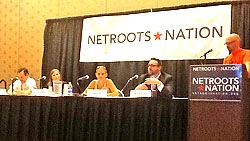 |
| Brown, Hodges, Brock, Sullivan, Crowley |
Next was a panel dear to my heart: When Democrats aren't Democrats: The Story of Rhode Island (watch) with five of my personal heroes: Steven Brown, ACLU, Paula Hodges, Planned Parenthood, Kate Brock, Ocean State Action, Ray Sullivan, Marriage Equality RI, and the moderator, NEA RI's Pat Crowley. If lightning had struck the dais, the entire political landscape in the state would have been shifted fifteen degrees rightward.
Crowley did a brief table-setting intro to the peculiarities of RI politics, which drew boos from the audience when he noted that a Democrat in the general assembly is a member of ALEC. Brock talked about the strategy for making progress. "On a lot of the issues we as progressives care about, we don't have a majority," she said, and stressed the importance of finding and working with legislators of all political stripes who could add leverage. "We need to identify firewalls who are with us on issues."
Brown elicited a few puzzled faces in the audience when he talked about how Rhode Island was the only state with Democratic majority in the general assembly (and a Democratic Secretary of State) to produce a voter ID law. It was all about anecdote, he said, saying that legislators all recounted friends of friends who had witnessed voter fraud, although there had been no cases prosecuted and none reported to the Board of Elections. "What other felony have so many people seen, and not reported?" he asked.
The explanation, Brown said, was that RI Democrats have such a big tent, "they invite everyone into the tent, no matter what their party may be." Crowley added dryly, "The tent is so big, it's a circus tent. That's how you let the elephants in."
Hodges, who was the most recent transplant to the state, shared some of her initial impressions, which was that our legislature proceeded by the "three Ps: preordained, private, and paternalistic." She recounted the story of the healhcare exchange bill, which made it almost all the way through the legislature before a toxic rider was attached, leaving the only option to work with the Governor to create the exchange through an executive order. But the fight, obviously, is far from over in Hodges estimation. "The new horizon in women's health access restriction will be conscience clauses."
For Brock, the survival strategy is "losing forward," in which the OSA coalition may not win on the issue, but achieves greater education and engagement. She talked about being able to raise public awareness around the recent Cimini amendement which would have attempted to redress the tax imbalance for those making over $250K. "I never imagined myself being passionate about tax policy," she admitted. "But I kept running into it, because people would always say, 'there's no money,'" a line she did not accept. "When they say there's no money, they're lying." She talked about how they had attempted to call the bluff of the trickle-down crowd by attempting to tie tax breaks to performance for the so-called job creators. "Create jobs? You get a lower tax rate."
Sullivan described last year's dashed hopes for marriage equality, which included the general assembly pulling a bait-and-switch to civil unions at the last minute, and accepting the noxious Corvese amendment on the floor. Sullivan chalked it up to the intense locality of the state, where legislators often face powerful voices in their districts and from the Catholic Church, as well as the nature of the "democrats" in the state as a whole. "The right wing of the Democratic Party in this state is way the hell more right than the Republican." He also wondered about the attitude of leadership at the legislature. "When a a leadership decision is made, and you go to the legislature [to push back] there's this attitude of 'How come you're still fighting? Didn't you hear us?'" He wondered aloud how things sometimes seemed so settled before the actual vote.
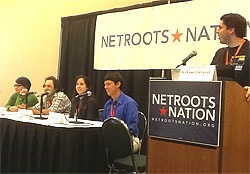 |
| Angelica Rubio, Bob Plain, Laura Packard, Phillip Martin; moderator Andrew Villeneuve |
Last panel of the day was also a favorite: Revitalizing State and Local Blogging (watch). Primarily of interest to those in the room, it offered perspectives on ways that progressive bloggers could connect, build networks, and leverage each other as shared resources. Villeneuve flipped the session, starting with questions from the audience and making it very interactive, so if you're interested, you'll want to watch the livestream. A proud moment for Rhode Island was Bob Plain, editor of our local progressive mothership, RI Future, putting a stake in the ground. Despite tales of blogs vanishing from the web and precarious local revenue, Plain said, "I intend to be the first one to make it work." (And if anyone can, it's Bob. I'll confess that this was the first time we met face-to-face, although we've exchanged dozens of e-mails. Try explaining *that* to anyone outside the state. Imagine someone from, say, Texas asking: "You live fifteen miles away and you've never gotten to Providence to meet?")
As I said, if you're interested in the closing keynotes, you should go watch the video. But I have to share one last highlight: between a video from President Obama and a rousing pitch from Gov. Howard Dean, Rep. Teresa Tanzi came out with a barnburner of a speech — you can go read it here. Tanzi deserves the last word on NN12...

|
| Rep. Teresa Tanzi |
"You need to join me. Take the next step, run for office. Yes, you. The one with the family, the job, the crushing load of schoolwork, the fuller than full plate. YOU! Anything less than full participation will not be enough.
Now, can you hear I’m talking to you? I need you standing beside me when the doors close to the public, and the negotiations begin. I need you sitting beside me, after the debate ends, the votes are taken and a proposal becomes law. I need your voice to be the voice of all the women, families and children who are voiceless and invisible. I need you to join me. You. I am talking to you. [...]
Take all that you have gathered here at Netroots; the ideas, the energy, the contacts. Take it all back to your communities and commit to engaging on a whole new level. You have to, because it is clear that what we, as progressives, have done in the past is not enough. Now is the time to demand more, give more and fight harder than you ever have. Anything less will not be enough."
